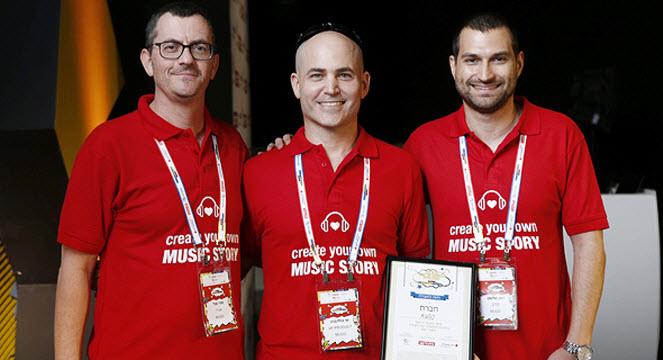
No need to share headphones: Music reaches social media
Israeli company MUGO brings the message of listening to music together to social media. After winning competitions, raising several million dollars in investments, and closing deals in South America, the entrepreneurs are looking to reach more places around the world.
On the third day of the exhibition, a Chinese man dressed simply with a baseball cap on his head approached the booth and began to ask questions. CTO Roman Slutzky, who was standing there at the time, was cautious with him. The partners had agreed earlier to be careful with the Chinese, who are quick to copy new developments, and they decided to be calculated.
When he asked the man what he was doing at the exhibition, the latter replied that he had a website. Suddenly, there was a murmur of excitement around the man. The audience identified him as founder of Baidu, the Chinese search engine, which is the substitute for Google in the vast country, closed to Western applications.
"The company (MUGO) attracted a lot of interest during the exhibition among telecom companies, media companies, car manufacturers, capital funds etc., and had dozens of meetings with significant decision makers," says Krael Amitay, Mobile Director of the Israel Export Institute. "Even after the exhibition, we continue to support and assist MUGO in a variety of ongoing activities."
What is MUGO?
The company was founded in 2016 in order to make music a social experience on smart mobile devices, and it has many social solutions on the internet, such as for Instagram, Facebook, and Snapchat.
"One of the key things that fills our leisure time is music," says Uri Segal, one of the founders and CEO of the company. "We wondered how we could make the experience complete. And how to turn the music into a social-experiential element, in the way Instagram did it for pictures and video, for example."
Segal, 46, a senior business manager, served in Shin Bet security service. Then, for many years, he served as the business development manager and manager of the Entrepreneur of the Year competition at Ernst & Young. After that, he left and opened an application development company that worked in Israel and abroad.
"In 2016, after eight years and with a wealth of knowledge and experience, I set out with my partner, Shai Goldberg—an IAF veteran who had a user experience development company—and Roman Slutzky, a graduate programmer from Merom, as a CTO," recalls Segal.
Not replacing music apps
MUGO syncs with all the music apps on a listener's mobile device, and this is where the social part comes into play. When you install the app, it aggregates different free cloud services, such as Cloud Sound and YouTube, or premium services like Spotify, Deezer or Apple, allowing two or more people to hear the same music in a synchronized manner. The app also allows chatting with others while listening. A user can also follow others and adopt their playlists.
Many artists have already realized the potential of the app and, in its Israeli version, many have joined it - such as Infected Mushroom, DJ Skazi and Beit Habubot.
In the spirit of social networking, the free app allows the listener to attach icons that characterize the nature of the music, create "stories" while inserting songs in them, and a unique feature allowing everyone around the user to listen to the same music.
So far, MUGO has raised $ 2 million from investors in the financial and music worlds. In 2017, the company won a competition held by Calcalist, as the most promising start-up of the year. As part of its win, MUGO was given the opportunity to exhibit at the MWC - the largest cellular exhibition, which is held annually in Barcelona.
"In the four days we were part of the Israeli pavilion - set up by the Export Institute and the Foreign Trade Administration - we scheduled hundreds of meetings," says Segal. "We were looking for investors, strategic partners, car companies and media companies, and we did not believe the intensity of the interest we aroused there."
MUGO offers the market a mass of regular daily users, which has great significance in assessing the importance of the company to potential buyers.
"Every user is important and has great marketing value for us," explains Segal. "We do not charge money for use, and we do not put advertisements, but rather we provide big data. Our listeners are a well-organized target audience for live shows and merchandise."
The app has recently introduced the option of watching live concerts in real time, which is a unique thing in the music market. Another thing that makes the app a profitable business model is the option all participants - both artists and non-artists - have of selling their self-made playlists.
Facing the world
The app has been honed and improved in Israel, and now its creators are presenting it to the world.
"We recently signed a $ 7 million investment deal with TV Azteca, which belongs to a large group that holds large corporations in Mexico. They have strategically added us to their Latin American goals, and next month we will begin our campaign there, with the help of opinion leaders and talents who are signed with TV Azteca," says Segal.
"The Mexican media market is dynamic and particularly interesting, offering many opportunities for Israeli companies. A big part of the attractiveness of the Mexican market comes from the effects of the reform in the communications market in Mexico since 2013, which contributed to the entry of foreign players into the local arena," says Uriel Raviv, head of the Ministry of Economy and Industry's Trade Mission in Mexico.
Raviv notes that "in recent years, we have seen a boom in the telecom and mobile sectors in the country, and just over the past year, investments in communication infrastructure have exceeded $4 billion."
He said Mexican companies are now more open to adopting innovative technologies and investments in the field, such as TV Azteca's investment in MUGO.
"The Trade Mission in Mexico is working to promote Israeli companies in the communications market throughout the year, and is inviting other Israeli companies to monitor the activities of the trade missions and the Export Institute in the field," Raviv adds.
MUGO plans to make its significant entry into Western Europe and the US market in September 2018, believing that entering the market in Central America will make business in Western Europe and the US easier. They later aim to enter the Asian market, particularly China and Japan.
Krael Amitay, the head of the Mobile Industry Department at the Export Institute, added that the mobile department was leading a move to facilitate the creation of business opportunities for Israeli companies with major players in the world, such as cellular operators Telecom Italia, Deutsche Telekom, British Telecom, Telefonica and others, as well as mobile device manufacturers such as HTC Xioami, Lenovo, Huawei, Asus, etc, and they are interested in creating business value for companies through B2B meetings in Israel and around the world.
The companies come from various fields, such as communications, value added services, virtual reality, augmented reality, big data and analytics, the Internet of Things, AI & Machine Learning and mobile applications.
"The value we provide to companies is in opening doors that significantly shorten the way to bringing together relevant business entities," says Amitay. "Our activities focus on quality meetings with key decision makers in national pavilions at leading international exhibitions and delegations in Israel and abroad. The focused meetings shorten the way for companies to reach agreements and help Israeli companies grow in international markets."
 |
In collaboration with the Export Institute.













